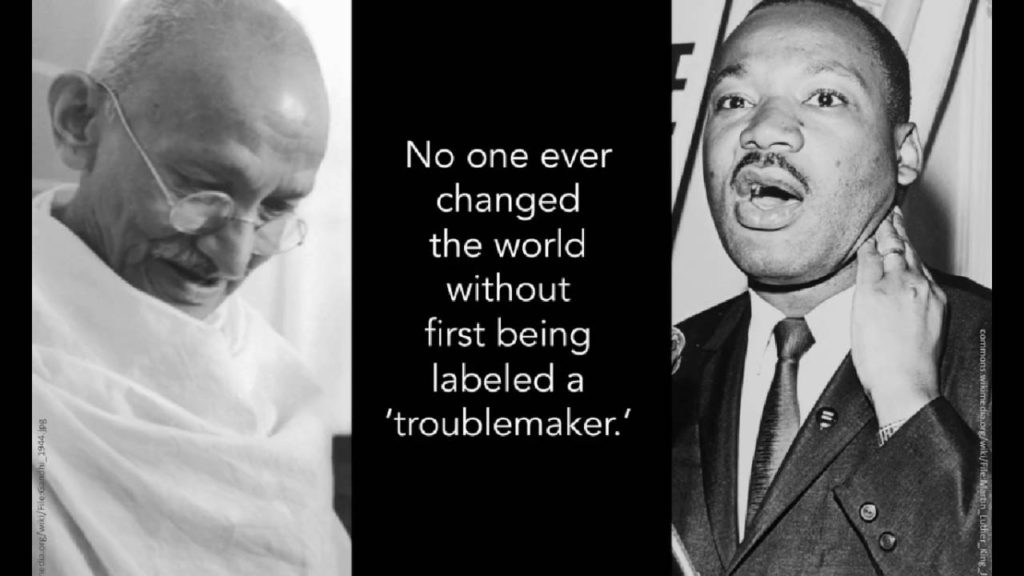I have a soft spot for trouble makers. But these are not the rabble rousers armed with animosity who incite violence and criminal acts. I’m talking about the people who question outdated rules and conventions that no longer work and challenge behavior that for too long has been inappropriate and unjust. They speak out when others remain silent and take action when many hold back in fear of what people will think. They question the “norm” when it no longer feels comfortable and right. They are deemed unconventional in the face of convention. They are full of conviction when others remain complacent. People sometimes refer to them as “trouble makers.” I call them “activists” and “advocates.”
And admirable. And we need more of them.
The late Martin Luther King Jr. was one of those so-called trouble makers. So was Joan of Arc. One was assassinated. The other was burned at the stake. Many years ago, the women who’ve spoken out for the #metoo and #timesup movements would have been called “troublemakers.” But then, so were the suffragettes who fought for the right to vote in the early 20th century and the woman’s libbers who marched for equal rights and reform in rhe 1960s. The women who marched on Washington last year, much like Dr. King did in 1963, would have been labeled “trouble makers” decades ago. Actually, any woman who raised a voice in protest would have been called “trouble maker.”
And, they still are. Around the world, woman still suffer the consequences for being considered “trouble makers,” for standing up for what they believe in and speaking out against injustice. Malala Yousafzai was shot in the head at age 15 for campaigning to improve girls’ education in Pakistan. She survived and later became the world’s youngest Nobel Prize laureate. Women are still fighting: domestic violence, human trafficking, genital mutilation, the right to have an education, the right to vote, the right to drive a car. Some of these are rights that woman once fought valiantly to obtain that many now take for granted.
The world is a better place thanks to people who speak out for justice and civility, who challenge laws that are unfair and question rules that are outdated. These are individuals for whom remaining silent is a worse crime than the act itself.
|
A little story on why empowering young women to speak out matters:
As a 12-year-old in sixth grade I waged a protest wearing the required white lace anklets and Mary Janes for my graduation ceremony. I announced that I wanted to wear pantyhose and heels with my white dress. “I was a young woman and no longer a child. Women wear pantyhose; children wear white lace anklets!” I argued. The school’s leadership responded, “But that’s been the traditional graduation attire for decades.” My response was “It’s time to change with the times.”
No one listened to me, the obstinate 12-year-old, except for my mother who stood for individuality (and still does). She marched into the school principal’s office to negotiate my case for changing the white lace anklet rule. Finally, the principal and fellow school poo-bahs relented with one condition: The young ladies had to wear white opaque stockings, not (lewd) nude pantyhose that showed (gasp!) our young flesh (as if white lace anklets were an adequate cover up either!)
The group photo of the graduating class of 1971 at The Bright School in Chattanooga shows young boys in white pants and shirts and young girls wearing white dresses, white stockings and white low-heeled shoes (no Mary Janes). And if you look very closely in the center of the photo, you’ll see one young girl with long dark blonde hair and large eyes wearing a very proud (smug) smile on her face. That’s the “troublemaker.”
It was my first lesson on being Fearless. And it stayed with me the rest of my life.
Lessons learned:
If something does not feel right, speak out. Ask questions. It’s your right. Don’t worry what people will think.
If you want to see change happen, do your homework. Present your argument with supporting facts
Expend your energy wisely. Sometimes a quiet steady voice with well-chosen words resonates louder that just making “noise.”
Create a community of support who can share your voice and message. There is strength in numbers.

My Final words…..
Often we can make a more meaningful impact by lowering the volume and improving the message. #FearlessFabulousYou @mightymelanie









